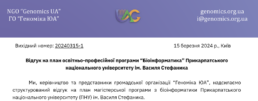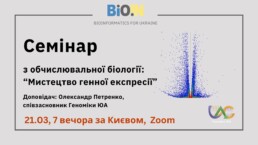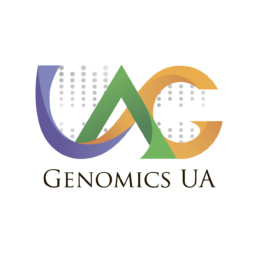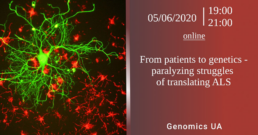Геноміка ЮА надає відгук на програму з біоінформатики ПНУ
2024-03-15 09:00 (GMT+2)
Команда Геноміки ЮА вже п'ять років працює над тим, щоб покращити освіту в Україні, зокрема, у сфері біоінформатики. Тому ми всіляко вітаємо ініціативи українських вчених та освітян щодо того, щоб розвивати цей напрям у системі формальної освіти. Нещодавно, колектив з Прикарпатського національного університету імені Василя Стефаника запропонував магістерську програму з біоінформатики для громадського обговорення. Ми вдячні за цей крок, і бажаємо успіхів команді для вдалого запуску. Нижче ми публікуємо у відкритий доступ наш відгук для кращого освітлення потенційним стейкхолдерам і тім, хто залучений в інші подібні програми. Ми також закликаємо нашу спільноту продовжувати подавати відгуки до 20-го березня. Інформація про програму та можливість надати відгук є на сайті ПНУ: посилання.
Запрошення на семінар з обчислювальної біології від Bioinformatics for Ukraine
2024-03-14 12:11 (GMT+2)
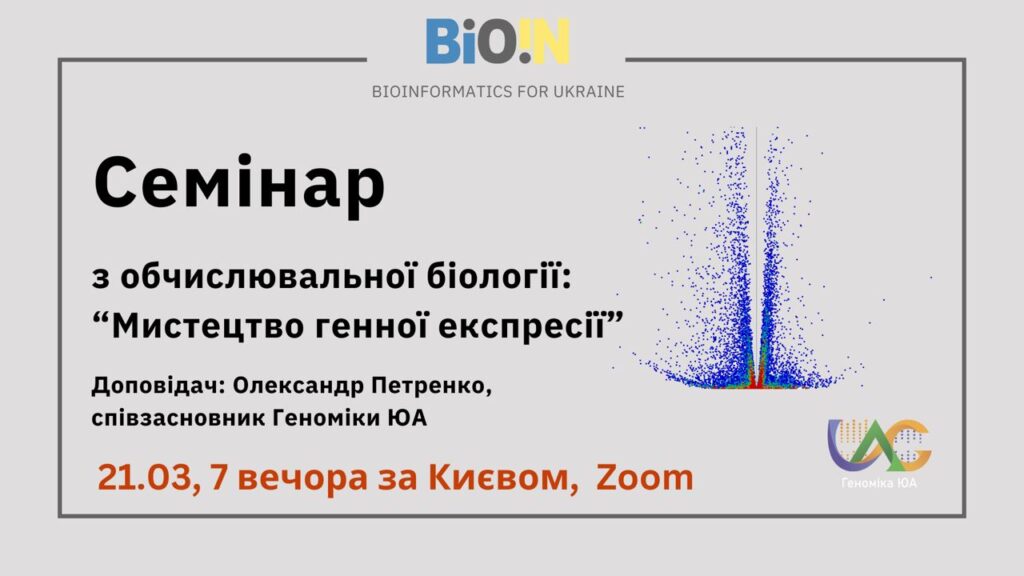
Хочемо запросити вас на семінар від наших друзів з Bioinformatics for Ukraine. Наступного четверга вони проводять зустріч, присвячену експресії генів. На ній буде про те, що таке транскриптоміка, в яких дослідженнях її застосовують, та чому вміння аналізувати транскриптомні дані відкриває багато кар'єрних можливостей
Розповідати про це буде Олександр Петренко, науковий співробітник Медичного університету Відня, співзасновник Геноміки ЮА та один з інструкторів курсу з аналізу даних РНК-секвенування.
Коли: 21-го березня, 7 вечора за Києвом.
Реєстрація: Google Spreadsheet. Зв'язок з організаторами: лінк.
Геноміка ЮА на Школі успіху
2021-08-11 02:09 (GMT+2)
UPD: 2024-02-26 02:27 (GMT+2)
Друзі, а знаєте, що ми робимо? Ми з радістю анонсуємо, що команда Геноміки приєдналася до ініціативи “Школа успіху. Костянтинівка”!🥳
🧬 Цей проєкт пропонує діалог між учнями шкіл і фахівцями з біології та пов’язаних з нею напрямів. У “Школі” ви зустрінете трьох учасників нашої команди:
📍 Валерія розповість про досвід навчання на біологічній спеціальності в Україні;
📍 Владислав поділиться досвідом застосування біоінформатики в наукових біомедичних проєктах;
📍 Юлія поділиться досвідом кар’єри в біології та біоінформатиці у США та Європі.
📣 Ми будемо дуже вдячні, якщо ви допоможете популяризувати цей захід. Для цього запросіть на заходи “Школи” знайомих учнів, які планують будувати кар’єру в біомедичних напрямках. А якщо ви самі маєте якісь питання на цьому етапі, то надішліть їх нам і ми спробуємо їх обговорити.
🔎 Деталі онлайн-заходу та реєстрація за посиланням:
https://www.facebook.com/events/1032688914205020.
Візуалізація даних
2021-07-19 02:48 (GMT+2)
UPD: 2024-02-26 02:51 (GMT+2)
Всім привіт✌️
У нас тут знову намічається зустріч!
💻 Запрошуємо усіх на вебінар, де ми обговоримо теорію статичної візуалізації даних та розглянемо практичні приклади на мовах програмування R та Python.
📝 План заходу:
1. Теорія та практика;
2. Бібліотеки Python: matplotlib та seaborn;
3. Бібліотека R: ggplot2.
🧑🏫 Лектори:
Марина Коршевнюк — PhD candidate, University Medical Center Groningen.
Дмитро Казанжи — Data analyst, National Health Service of Ukraine.
Олександр Петренко — PhD Student, Ludwig Boltzmann Institute for Rare and Undiagnosed Diseases.
📅 Коли: 22 липня 2021, 19:00 (Київ)
🌎Де: Zoom
(https://us02web.zoom.us/j/82769997848?pwd=ZkdhUEtBQzB3M3puVlhHcHBBTFdGQT09)
🗓Додати до календаря: https://calendar.google.com/event?action=TEMPLATE&tmeid=MGo3ZWFndXNodWw5YjRpbGtxMjVkZ3Njam0gZ2Vub21pY3N1YS5vcmdAbQ&tmsrc=genomicsua.org%40gmail.com
Дорожня карта у біоінформатиці | Bioinformatics Roadmap
2021-07-14 02:47 (GMT+2)
UPD: 2024-02-26 02:50 (GMT+2)
З чого почати вивчення біоінформатики?
Аби допомогти початківцям та студентам розпочати вивчення біоінформатики, ми узагальнили наш досвід та рекомендації у Roadmap до біоінформатики. Тут ви можете вибрати будь-який шлях та розпочати вивчати основні теми, необхідні для успіху в аналізі біологічних даних.
Якщо ви хочете адаптувати для себе цей постер, сміливо копіюйте та редагуйте його версію draw.io.
А якщо ви досвідчений біоінформатик, ми будемо надзвичайно раді вашому внеску у вдосконалення та завершення цієї візуалізації!
Computer science, math, statistics, different fields of biology, chemistry, medicine - all of this is needed to succeed in bioinformatics. But what to start with?
To help beginners and students to start with learning bioinformatics, in Genomics UA we summarised our experience and recommendations in a Roadmap to Bioinformatics.
Here you can choose any path and get started with basic topics, needed to succeed in biological data analysis.
If you would like to customize this poster, feel free to copy and edit its draw.io version.
Also, if you are experienced with bioinformatics, your contribution to improving and completing this visualization is more than welcome!
Training course in single-cell biology
2021-03-08 02:47 (GMT+2)
UPD: 2024-02-26 02:48 (GMT+2)
Single-cell analysis is an extremely powerful tool to discover biological processes due to its high resolution and wide range of possibilities. So we decided to organize a short but in-depth course in this field. We would like to invite you to our practical course in single-cell biology to become familiar with core single-cell analysis methods.
This course is a series of online events that highlight the theoretical basics of single-cell analysis. The program covers sample preparation, data processing, and workshops on different pipelines, including scRNAseq, scATACseq, TCR/BCR sequencing, CITEseq, and much more.
Meeting days are:
- Sunday, 4.04.2021
- Monday, 5.04.2021
- Wednesday, 7.04.2021
- Friday, 9.04.2021
- Saturday, 10.04.2021
Each meeting starts at 18.00 CET and will take approximately 2-3 hours. The format of the event is Zoom-meeting with breakout-rooms if needed. All participants will be supplied with individual tasks, study materials, and instructions for hands-on sessions.
Speakers:
- Vladyslav Kavaka, MD candidate, LMU Munich
- Maryna Korshevniuk, PhD Candidate, UMCG
- Oleksandr Petrenko, Predoctoral Fellow, LBI-RUD / CeMM
- Yuliya Syntikova, PhD, LifeMine Therapeutics
Requirements:
- Basic knowledge in cell and molecular biology;
- Basic skills in R programming language;
- No prior knowledge of single-cell analysis is required.
Language: English
Registration:
To register for the course in single-cell biology, please complete the following form: https://forms.gle/H3zXb1ofaSvZ3bKg8
The deadline for registration is 31.03.2021.
Detailed programs will be announced one week before the event. All participants will receive the mail with further instructions and study materials.
Біоінформатика: з чого почати
2020-12-31 02:44 (GMT+2)
UPD: 2024-02-26 02:47 (GMT+2)
Мабуть, кожному відомо, що в 21 сторіччі важливі відкриття відбуваються у дисциплінах, які є на межі двох, або більше наук. Прикладом такої є біоінформатика, де біологічні дані обробляються комп’ютерними алгоритмами і дають відповіді на загадки природи. У новачків, що зацікавились біоінформатикою, виникає питання: “А що треба знати, щоб стати біоінформатиком?”
Саме тому ми вирішили зібрати курси та ресурси, які допоможуть вам на цьому шляху. Напевно, треба починати з розуміння роботи в операційних системах сімейства Linux та програмування на мові R, але не забувайте читати цікаві статті та пробувати використовувати на практиці отримані знання.
Якщо ви рекомендуєте якийсь курс, напишіть t.me/kazanzhy або залиште коментар в Google-документі. Команда “Геноміка ЮА” буде дуже вдячна за допомогу. Щоб переглянути у більш зручному вигляді перейдіть за посиланням на Google-документ.
https://docs.google.com/document/d/1XuSB8qApfOfb3625Lhg4C3TzCpsAWtoSwngypjIlYXU/edit?usp=sharing
Менеджмент біомедичних даних
2020-12-26 02:45 (GMT+2)
UPD: 2024-02-26 02:47 (GMT+2)
Лекція Rostyslav Kuzyakiv (clinical data scientist в Zurich Hospital) про те що як обробляти біомедичні дані.
Вебінар присвячений biomedical data life cycle management, про те які виклики зараз стоять перед аналітиками біомедичних даних та які є доступні open source рішення.
Ця тема напряму пов’язана з біологами, медиками та усіма хто залучений у сучасні наукові проєкти. В презентації буде висвітлений досвід роботи у наукових дослідженнях з боку BioMed Data Life Cycle.
Прикладом для кращого висвітлення теми буде портал Університету Цюриха для Data management, аналізу і візуалізації.
А наприкінці трохи про самоосвіту в Data management та Bioinformatics data analysis, найпоширеніші інструменти та методики.
Приємного перегляду!
Pandas та ML workshop
2020-12-26 02:43 (GMT+2)
UPD: 2024-02-26 02:45 (GMT+2)
У вересні відбулись два семінара по введенню в машинне навчання від Jenya Sidyakin та про основи бібліотеки Pandas від Dmytro Kazanzhy.
Приємного перегляду!
Lecture: From patients to genetics – paralyzing struggles of translating ALS by Sophie Imhof
2020-05-19 02:42 (GMT+2)
UPD: 2024-02-26 02:44 (GMT+2)

The topic of the lecture: From patients to genetics – paralyzing struggles of translating ALS
Speaker: Sophie Imhof, PhD Student at the Medical University of Vienna, Department of Neurology, author of a blog for science communication: https://www.instagram.com/sophie_imhof/
When: 05.06.2020 at 18:00 (Vienna time) | 19:00 (Kyiv time).
Where: Online. We invite you to connect via Zoom to participate in the discussion after the lecture, or to join the YouTube translation. The access links will be provided after free registration: https://www.eventbrite.com/e/105936210056
Open lectures of the NGO “Genomics UA” is a non-formal education format in which invited experts talk about their projects or research field. After a presentation, we organize a Q&A session with the speaker and provide an opportunity for informal communication and networking.
Amyotrophic lateral sclerosis is a fast progressing and lethal neurodegenerative disease that predominantly affects the upper and lower motor neurons. To this point, there is no cure for this pathology and patients have a life expectancy of 3 months to 5 years. Only 10% of cases are due to genetic and hereditary reasons (familial ALS), leaving 90% of patients in the dark of the underlying mechanism of their pathology (sporadic ALS). Only two FDA approved compounds, Riluzole, which prolongs life for up to 3 months, and Edaravone, which was shown to slow down disease progression, are used to treat ALS patients, however, they remain drugs of low efficiency. Out of this reason, researchers worldwide are establishing models and using state-of-the-art technology to investigate this disease. Although our community of ALS scientists and clinicians is eager to beat this pathology, we face many obstacles in the form of patient heterogeneity, different molecular phenotypes, and technical limitations. To overcome these burdens, I believe we need to change our mindset and perspective on this disease and step one step back to discover novel niches of research. Patient cohorts, genetics, iPSCs, stem cell therapy, vitamin supplements – what do we actually know about this disease and how can we pave a new path for effective treatment?
Additional information:
– How can I join and ask questions?
– You need to register on zoom.com (it’s free), download the program, go to the link provided in the event announcement, and enter the password. Or just enter the meeting ID and password if you have already installed and opened the program. If possible, join our meetings with a turned-on camera, it helps to create a presence effect for more informal communication. Participants usually turn off the microphone while someone else is talking. If you have questions before the end, feel free to send them to the chat. If you can not join us via Zoom, there is an alternative to join through the YouTube stream. If you watch us on YouTube, you can ask questions in the chat and our moderators will check them.
– I liked the event / I have more questions / I want to be in touch with you.
– First of all, thank you for your interest! We have put together a biomedical community in Telegram and you are invited to join. Go to the channel https://t.me/GenomicsUA, subscribe, and in the description, you will find a link to the chat. If you are not a Telegram user, feel free to drop your question to i@genomics.org.ua, or to our Facebook page.
Don’t forget to subscribe to our Facebook page:
https://www.facebook.com/GenomicsUA
To our YouTube channel:
https://www.youtube.com/ngogenomicsua
And to the local representative office of the organization:
Kyiv: https://www.facebook.com/kyivbioinformatics/
Odesa: https://www.facebook.com/odesabioinformatics/
If you have any questions, please contact us in any of these ways.
